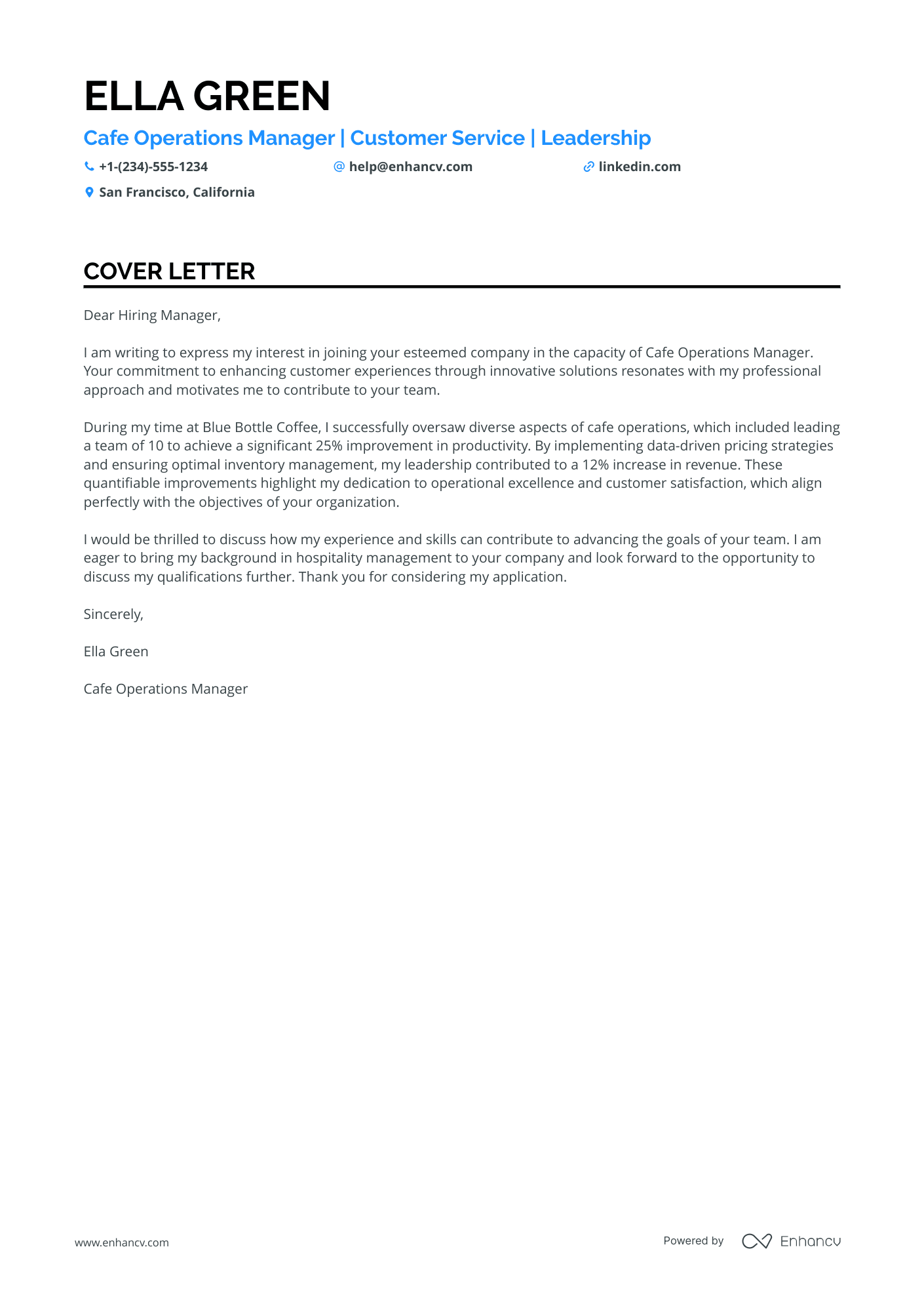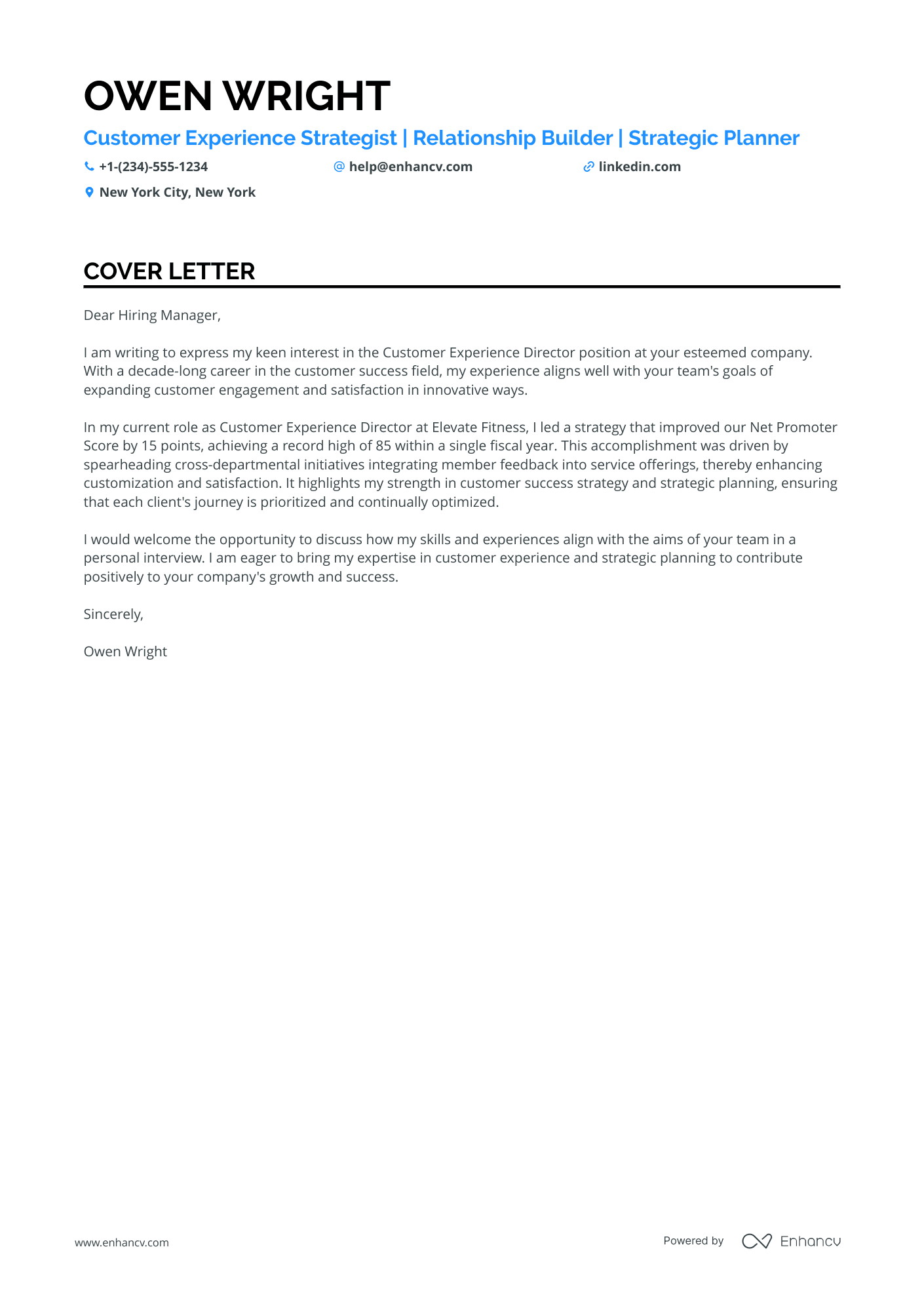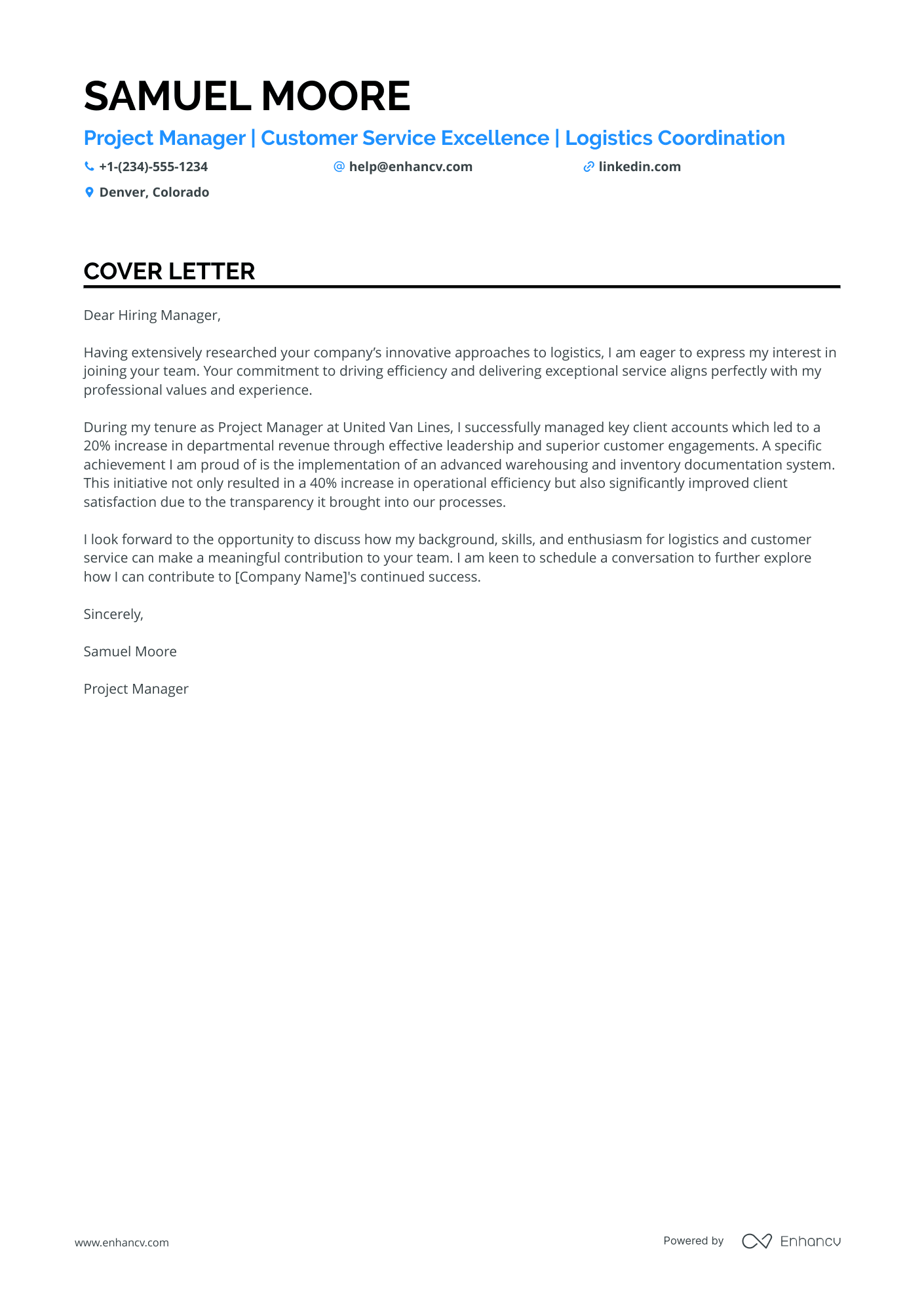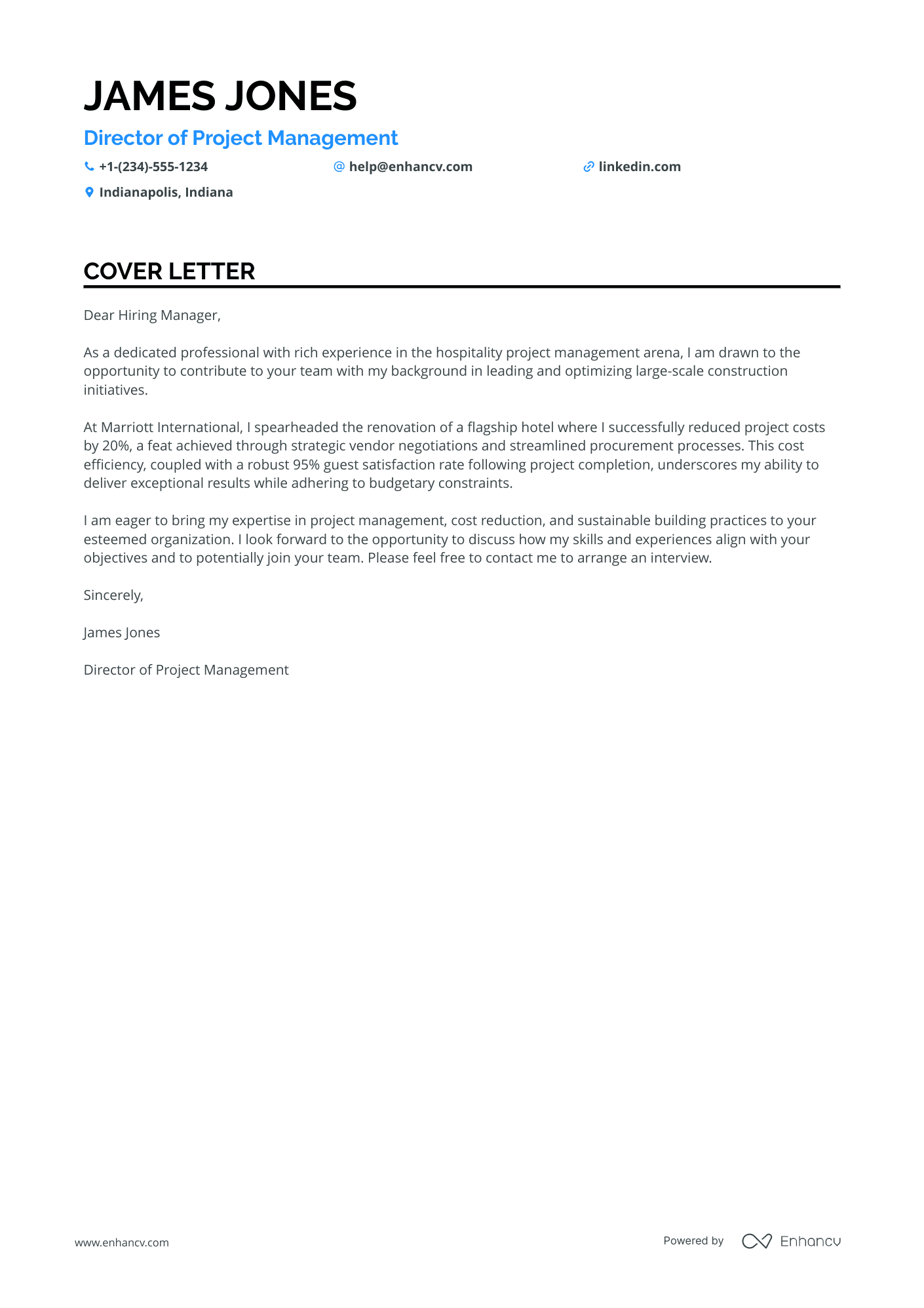Crafting a hospitality cover letter can be a daunting task, especially if you're already jumping through the hoops of job applications. Remember, your cover letter isn't a rerun of your resume; it's your chance to spotlight that one major achievement that you're incredibly proud of. Maintaining a formal tone while steering clear of worn-out phrases is key, and brevity is your friend—stick to one page to make a lasting impression without overwhelming your potential employer.
- Write a hospitality cover letter that helps you stand out (and get the job);
- Understand how to start and end your hospitality cover letter with the appropriate greeting;
- What to include in the body of your hospitality cover letter to put your best foot forward;
- Your most important achievements - how to present them as part of your hospitality cover letter.
And if you want to make your life even easier, simply drag and drop your hospitality resume into Enhancv's AI cover letter generator, and it will write your cover letter for you in just a few moments.
If the hospitality isn't exactly the one you're looking for we have a plethora of cover letter examples for jobs like this one:
Drop your resume here or choose a file.
PDF & DOCX only. Max 2MB file size.
Hospitality cover letter example
OLIVER DAVIS
Houston, Texas
+1-(234)-555-1234
help@enhancv.com
- Quantifiable Achievements: The cover letter effectively highlights quantifiable achievements, such as the "25% reduction in delivery errors" and "40% increase in compliance," which provide concrete evidence of the candidate's ability to create positive outcomes.
- Relevant Experience: Mentioning the specific role of "Senior Dietary Aide" helps to establish the candidate's relevant work experience within a similar healthcare setting, reinforcing their suitability for the Nutrition Services Manager position.
- Initiative in Process Improvement: Describing the initiative to overhaul the meal tracking system showcases the candidate's proactive approach and ability to lead projects that enhance the department's operations and patient care.
- Alignment with Organizational Values: The cover letter demonstrates how the candidate's professional philosophy aligns with the company's commitment to excellence and patient-centered care, suggesting a cultural fit with the potential employer.
The format of your hospitality cover letter: structure, fonts, margins, and more
Your hospitality cover letter should include a header (with your name, position, and date); a greeting and introductory paragraph; a body and closing paragraphs; and an optional signature.
Remember that you're writing your hospitality cover letter for recruiters - as the Applicant Tracker System won't scan this content.
Here are a few more tips and tricks to keep in mind when formatting your hospitality cover letter:
- Use the same font in your hospitality cover letter and resume. We recommend modern fonts, e.g. Lato and Rubik, to help you stand out, instead of the stereotypical Arial and Times New Roman.
- Each paragraph should have single spacing, which is already set up for you in our cover letter templates.
- Our cover letter builder follows industry standards for your hospitality cover letter formatting - with a one-inch margin, surrounding your content.
- Always export your hospitality cover letter in PDF to ensure the image or text quality stays the same and your writing isn't moved about.
Pressed for time? Use our free cover letter generator to turn your resume into a cover letter effortlessly.
The top sections on a hospitality cover letter
- Header: Include your name, contact information, and the date to ensure the recruiter can easily identify and reach out to you for follow-up correspondence.
- Greeting: Address the letter to a specific person if possible, showing attention to detail and a personalized approach, which are both important in hospitality roles.
- Introduction: Briefly introduce yourself and state the position you're applying for, emphasizing your passion for the hospitality industry and your desire to provide exceptional guest experiences.
- Body: Divide this into two or three paragraphs where you detail your relevant experience, achievements, and skills, focusing on how they align with the requirements of the hospitality role and how you can contribute to the guest's satisfaction and the establishment's success.
- Closing: Conclude with a proactive statement, thanking the recruiter for considering your application and expressing eagerness to discuss how your expertise aligns with their team, reinforcing your commitment to guest service excellence.
Key qualities recruiters search for in a candidate’s cover letter
- Exceptional customer service skills: Recruiters look for candidates who demonstrate the ability to provide outstanding service and create memorable experiences for guests.
- Strong communication abilities: Effective verbal and written communication is crucial in hospitality to ensure clear information exchange with guests, colleagues, and management.
- Flexibility and adaptability: The hospitality industry demands the ability to handle diverse situations and quickly adjust to changing guest needs or unexpected issues.
- Attention to detail: Recruiters prioritize individuals who are meticulous and can maintain high standards in all aspects of their work, from guest interactions to maintaining facilities.
- Teamwork and collaboration: Hospitality roles often require working with other staff members, requiring a cooperative spirit and the ability to work well as part of a team.
- Cultural sensitivity and language skills: Being able to engage with guests from different backgrounds and potentially communicate in more than one language is highly valued in the hospitality industry.
How to greet recruiters in your hospitality cover letter salutation
As the saying goes, "You never get a second chance to make a first impression."
Write your hospitality cover letter salutation to be more personalized to the actual hiring manager, who is set to assess your profile by:
- greeting them on a first-name basis, if you have previously communicated with them (e.g. "Dear Sam,");
- using their last name, if you have more formal communication or haven't spoken to them (e.g. "Dear Mr. Harrows" or "Dear Ms. Marshall");
- writing "Dear HR Team" or "Dear Hiring Manager", if you have no clue about who's recruiting for the role.
Search on LinkedIn, Google, or the company website to find information as to the recruiter's name.
In any case, avoid the impersonal "Dear Sir or Madam".
List of salutations you can use
- Dear Hiring Manager,
- Dear [Company Name] Recruiter,
- Dear Mr./Ms. [Last Name],
- Dear Search Committee,
- Dear Talent Acquisition Team,
- Dear Human Resources Director,
The hospitality cover letter introduction: focusing on your unique value, with a creative twist
You are not the only one wondering how to start your hospitality cover letter. Those first two sentences introduce your profile and should be memorable.
No pressure.
When beginning your hospitality cover letter, immediately point out the unique value of working with you. In other words, what you promise to bring to the role by using your past track record of success.
Start your hospitality cover letter with a creative twist by telling a joke or stating something relatable. Select this type of introduction only if it aligns with the company culture.
How to write an achievement-focused hospitality cover letter body
We've got the intro and greeting covered. Now, comes the most definitive part of your hospitality cover letter - the body.
In the next three to six paragraphs, you'd have to answer why should recruiters hire you.
What better way to do this than by storytelling?
And, no, you don't need a "Once upon a time" or "I started from the bottom and made it to the top" career-climbing format to tell a compelling narrative.
Instead, select up to three most relevant skills for the job and look back on your resume.
Find an achievement, that you're proud of, which has taught you these three job-crucial skills.
Quantify your accomplishment, using metrics, and be succinct in the way you describe it.
The ultimate aim would be to show recruiters how this particular success has built up your experience to become an invaluable candidate.
Closing paragraph basics: choose between a promise and a call to action
You've done all the hard work - congratulations! You've almost reached the end of your hospitality cover letter.
But how do you ensure recruiters, who have read your application this far, remember you?
Most hospitality professionals end their cover letter with a promise - hinting at their potential and what they plan on achieving if they're hired.
Another option would be to include a call for follow-up, where you remind recruiters that you're very interested in the opportunity (and look forward to hearing from them, soon).
Choose to close your hospitality cover letter in the way that best fits your personality.
Keep this in mind when writing your zero experience hospitality cover letter
Even though you may not have any professional experience, your hospitality cover letter should focus on your value.
As a candidate for the particular role, what sort of skills do you bring about? Perhaps you're an apt leader and communicator, or have the ability to analyze situations from different perspectives.
Select one key achievement from your life, outside work, and narrate a story that sells your abilities in the best light.
If you really can't think of any relevant success, you could also paint the picture of how you see your professional future developing in the next five years, as part of the company.
Key takeaways
Writing your hospitality cover letter doesn't need to turn into an endless quest, but instead:
- Create an individual hospitality cover letter for each role you apply to, based on job criteria (use our builder to transform your resume into a cover letter, which you could edit to match the job);
- Stick with the same font you've used in your resume (e.g. Raleway) and ensure your hospitality cover letter is single-spaced and has a one-inch margin all around;
- Introduce your enthusiasm for the role or the company at the beginning of your hospitality cover letter to make a good first impression;
- Align what matters most to the company by selecting just one achievement from your experience, that has taught you valuable skills and knowledge for the job;
- End your hospitality cover letter like any good story - with a promise for greatness or follow-up for an interview.
Hospitality cover letter examples
By Experience
Hospitality Assistant
- Quantify achievements: The letter mentions a 25% improvement in productivity and a 12% increase in revenue, which effectively demonstrates the impact of the applicant's contributions.
- Specific Experience: The detailed experience from Blue Bottle Coffee in overseeing cafe operations shows the applicant has practical and relevant experience for a cafe operations manager role.
- Alignment with Company Values: The applicant highlights an alignment with the company's commitment to enhancing customer experiences, demonstrating an understanding of the company culture and goals.
By Role
Hospitality Manager
- Specific Achievements: The cover letter highlights a significant improvement in Net Promoter Score, showcasing a measurable achievement that is relevant to the role of Customer Experience Director.
- Cross-Departmental Initiatives: Emphasizing the ability to lead cross-departmental initiatives demonstrates strategic planning skills and collaboration capabilities essential for directing customer experience.
- Client-Centric Focus: Mentioning the integration of customer feedback into service offerings reflects a deep commitment to enhancing the user experience, which is crucial for a role focused on customer success.
- Personalized Introduction: Expressing a keen interest in the specific role and company indicates a tailored approach, making the candidate appear more invested and suitable for the position.
Hospitality Coordinator
- Emphasizing experience in managing key client accounts by providing quantitative evidence (20% increase in revenue) showcases the candidate’s impact on past roles.
- Highlighting a specific project implementation, such as an advanced warehousing system, to illustrate problem-solving skills and the ability to improve operational efficiency (40% increase in efficiency).
- Aligning personal values and professional experience with the company’s mission (efficiency and exceptional service) helps demonstrate cultural fit and genuine enthusiasm for the role.
- Expressing eagerness to discuss further in a conversation positions the candidate as proactive and interested in contributing to the company’s success.
Hospitality Director
- Specific Achievements: The cover letter effectively highlights a specific accomplishment, such as reducing project costs by 20%, to demonstrate the candidate's effectiveness and impact within the industry.
- Quantifying Success: It uses quantifiable metrics, like the 95% guest satisfaction rate, to provide measurable evidence of the candidate’s ability to achieve and exceed project goals.
- Relevant Experience: The letter relates back to direct experience with Marriott International, a reputable name in hospitality, lending credibility and relevance to the candidate's background.
- Alignment with Company Objectives: The applicant expresses eagerness to align with the organization's goals in project management and sustainable practices, which shows they can contribute to the company's strategic direction.













